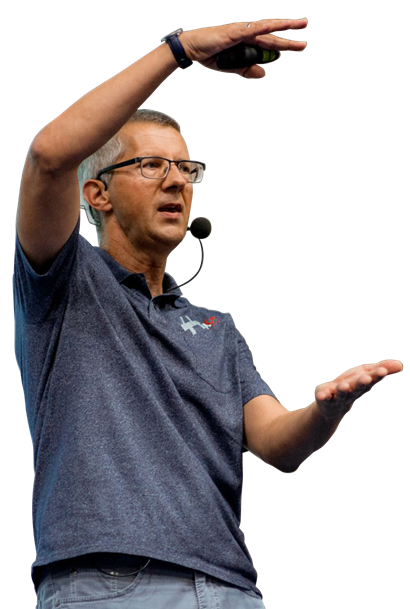My ALS Journey (16/n): Good Bye Training / Hello Mentoring
In 2025, I will no longer offer C++ classes. Instead, I will only offer C++ mentoring in the future.
>> My ALS Journey so far <<
Today’s report is very technical. I explain why I switched from training to mentoring. This switch is also due to the fact that I cannot integrate classes anymore in my daily life.
I promise that in the next report, I will have exciting news.
Good Bye Training / Hello Mentoring
Trainer since 2002

I`ve worked as a software architect, team lead, and instructor since 1999. In 2002, I created company-intern meetings for further education. Our company-intern meeting started with design patterns, continued with architectural patterns, communication protocols, and frameworks, and finally, discussed security protocols and programming languages in general.
I have been giving training courses since 2002. The first seminars were about proprietary management software, but I soon began teaching Python and C++. Since 2008, I have provided worldwide online seminars.
In 2011, I published the first worldwide C++11 book. Since then, I have published eight additional C++ books translated into five languages. I love to write about C++ and Python and publish weekly on my English blog, Modernes C++, and the German blog hosted by Heise Developer.
Since 2016, I have been an independent instructor and do the work I love: learn and teach. In a typical year, I give 40 to 50 seminars about modern C++ and Python, participate in 10 conferences, and provide presentations and workshops for them.
From Trainer to Mentor
In 2022, I created my first mentoring program, “Fundamentals for C++ Professionals”. This program is the basis for the five following:
- Design Patterns and Architectural Patterns in C++”
- “C++20: Get the Details”
- “Concurrency with Modern C++
- “Generic Programming (Templates) with C++”
- “Embedded Programming with Modern C++”
In the next year, two C++ programs will follow:
 Modernes C++ Mentoring
Modernes C++ Mentoring
Do you want to stay informed: Subscribe.
- Clean Code
- High-Performance Computing
You may wonder why I put so much effort into my mentoring programs. I’m very successful as a trainer and typically booked worldwide for nine months. The answer is easy.
Mentoring is the Future of Training

So far, I had 100 mentees. Let me compare training and mentoring.
Duration
The first noticeable difference is its length.
- The training is for three days. Each day has essentially 6 hours of content.
- In contrast, mentoring takes four to eight months. You must invest at least three hours each week.
Overall Content
This comparison shows it crystal clear. Mentoring provides way more content and gives way more flexibility.
- The training plan is well-structured. Making detours or discussing additional topics is challenging because I have to drop other important features. This is only possible if all the participants agree. I teach 3 (days) * 6 hours = 18 hours.
- Mentoring also has a well-structured plan, but I have the time to discuss additional topics with all or individual mentees. In the end, I never have to say no regarding these detours. This is very beneficial for the mentees and me. I teach 39 (weeks) * 3 hours = 108 hours.
Number of Participants
The number of people in training is pretty limited, but not in mentoring.
- The ideal number of participants in training is between five and ten. In general, I accept no more than 15 participants.
- Mentoring works the other way around. At least 100 participants work very well; the more participants you have, the better.
Interaction
With mentoring, there is a new dimension of interaction.
- In training, you mainly interact with the trainer. This interaction ends when the training ends.
- In mentoring, you can interact with me directly in the weekly Q&A session. Additionally, you can ask your questions in the forums. Now, you can use the active community. I moderate the forum and answer the questions if necessary. This works very well.
Integration
How can you integrate training or mentoring into your private and business commitment?
- For training, this is easy. You have to dedicate the three proposed days to the class.
- You may wonder how an eight-month mentoring can be integrated into your private commitments (family, holiday) and business commitments. This is easy. All content is available offline. The Q&A sessions are recorded, the forum is online, and the videos, articles, and slides are always available. Additionally, I make a week without additional content every four or six weeks. Therefore, it is pretty easy to catch up with the content. This helps you do the mentoring besides your business workload or family commitments.
Sustainability
Sorry, I have to say this, but classical training has serious issues.
- After my three-day training, you are, like me, pretty exhausted. You learn so much that it is quite probable that you will forget a lot if you cannot use it in your daily work. The main issue we talk about a new feature only once in training.
- In mentoring, you will experience a new feature a few times from different perspectives. Additionally, you can consume the theory more than once, discuss this feature in the forum or the Q&A sessions, and practice it in the exercises. Ultimately, you get a deeper and more sustainable impact of the feature.
Costs
The charges for taking open training or mentoring are comparable.
Resume
You may assume it from the comparison. After almost 20 years of training and mentoring, mentoring is my favorite. Additionally, I assume that your company supports you with time and money. Training may be the right choice only when you need a quick and concise refresher and are a pretty seasoned C++ developer.
Thanks a lot to my Patreon Supporters: Matt Braun, Roman Postanciuc, Tobias Zindl, G Prvulovic, Reinhold Dröge, Abernitzke, Frank Grimm, Sakib, Broeserl, António Pina, Sergey Agafyin, Андрей Бурмистров, Jake, GS, Lawton Shoemake, Jozo Leko, John Breland, Venkat Nandam, Jose Francisco, Douglas Tinkham, Kuchlong Kuchlong, Robert Blanch, Truels Wissneth, Mario Luoni, Friedrich Huber, lennonli, Pramod Tikare Muralidhara, Peter Ware, Daniel Hufschläger, Alessandro Pezzato, Bob Perry, Satish Vangipuram, Andi Ireland, Richard Ohnemus, Michael Dunsky, Leo Goodstadt, John Wiederhirn, Yacob Cohen-Arazi, Florian Tischler, Robin Furness, Michael Young, Holger Detering, Bernd Mühlhaus, Stephen Kelley, Kyle Dean, Tusar Palauri, Juan Dent, George Liao, Daniel Ceperley, Jon T Hess, Stephen Totten, Wolfgang Fütterer, Matthias Grün, Phillip Diekmann, Ben Atakora, Ann Shatoff, Rob North, Bhavith C Achar, Marco Parri Empoli, Philipp Lenk, Charles-Jianye Chen, Keith Jeffery,and Matt Godbolt.
Thanks, in particular, to Jon Hess, Lakshman, Christian Wittenhorst, Sherhy Pyton, Dendi Suhubdy, Sudhakar Belagurusamy, Richard Sargeant, Rusty Fleming, John Nebel, Mipko, Alicja Kaminska, Slavko Radman, and David Poole.
| My special thanks to Embarcadero |  |
| My special thanks to PVS-Studio |  |
| My special thanks to Tipi.build |  |
| My special thanks to Take Up Code |  |
| My special thanks to SHAVEDYAKS |  |
Modernes C++ GmbH
Modernes C++ Mentoring (English)
Rainer Grimm
Yalovastraße 20
72108 Rottenburg
Mail: schulung@ModernesCpp.de
Mentoring: www.ModernesCpp.org
Modernes C++ Mentoring,




